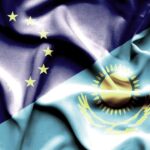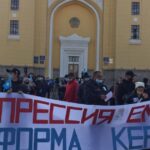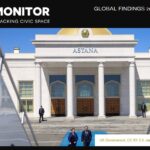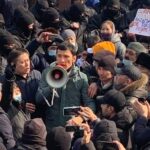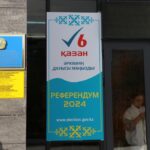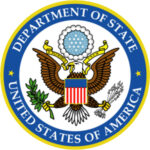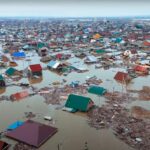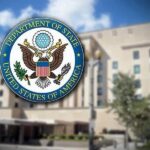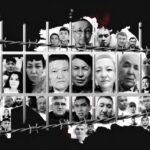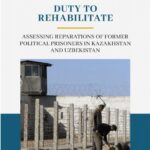Public statement
21 March 2012
On the 24 March it will be 100 days since the worst confrontation between protesters and police in Kazakhstan’s recent history left at least 15 people dead and dozens injured in the south western oil city of Zhanaozen.
Amnesty International is concerned that the force used to disperse the violent protests was excessive and that the investigations into the use of firearms by security officers have been inadequate. There have been numerous reports of widespread torture and other ill-treatment of those detained by security forces in the aftermath of the violence and investigations into these allegations do not to date appear to be thorough and impartial. The organization is also concerned at the arrests and detentions of labour activists and political opposition representatives in relation to the Zhanaozen events and fears that they may not be given fair trials.
Amnesty International is writing to the Kazakhstani authorities to express its concerns over a number of questions it believes have not been fully answered or addressed by the official investigations carried out into the violent clashes between protesters and the police on 16 and 17 December 2011. These questions concern aspects of the investigations initiated by the authorities into the use of firearms by the police to disperse the crowds on 16 and 17 December 2011, the deaths and injuries that resulted from the use of lethal force by the security forces, the hundreds of detentions, many of them, reportedly, arbitrary, immediately following the clashes, and the reports of widespread torture or other ill-treatment of those detained by security forces.
While Amnesty International welcomes the authorities’ repeated public commitments to conducting fair and transparent investigations into all the human rights abuses committed in Zhanaozen, including human rights violations by security forces, it fears that, in practice, they may fall far short of international standards of thorough, impartial and independent investigations and fail to deliver justice to all those affected. Despite repeated assertions by the Kazakhstani authorities over the last two decades that they are fully committed to upholding and implementing their international human rights obligations, they have an extremely poor track record of investigating reports of human rights violations by security forces and bringing alleged perpetrators to justice.
Most recently Amnesty International wrote to the Kazakhstani authorities in July 2011 to express concern that some of the methods used by the security forces in policing the strike actions by oil industry workers in Mangistau Region since May 2011 had been disproportionate and in breach of national legislation and international obligations and had heightened tensions in the region. The organization was worried that the failure of the authorities to investigate the violations by the security forces promptly, thoroughly and impartially had added to the grievances of the workers, their families and supporters and could potentially lead to an escalation of violence.
In addition Amnesty International is concerned at the arrests of opposition political activists and representatives of striking oil industry workers in Mangistau region charged respectively with inciting social discord and with organizing mass disturbances and social unrest in connection with the Zhanaozen events. They were reportedly targeted for supporting the striking workers in the months leading up to 16 December 2011 and publicizing their concerns and demands at home and abroad. Given the number of prejudicial statements made by public officials against those arrested, the procedural violations in the criminal cases brought against them, and Kazakhstan’s long history of systemic and systematic failures to ensure and respect fair trial guarantees, the organization questions whether those charged with criminal offenses in relation to Zhanaozen will be given a fair and just hearing.
The use of lethal force by security forces during violent clashes with protesters in Zhanaozen
On 16 December 2011as final preparations for the official celebrations of 20 years of independence got underway in Zhanaozen some young men and oil workers on strike since May 2011, tore down festive displays in the town’s central square and reportedly attacked police and local town officials, some with stones and sticks. Eyewitnesses claimed that some police fired warning shots into the air but that others fired directly into the large crowd in the square, which included women and children out to celebrate. Amateur video footage showed security forces aiming and shooting their weapons at protesters running away and beating those lying injured on the ground. According to official figures at least 14 people were killed and dozens seriously injured, 64 with shotgun wounds. One protester was killed on 17 December in a separate incident in the village of Shetpe when security officers dispersed protesters who had blocked a railway line. Other sources have estimated the number of dead to be at least three times the official death toll. Officials reported 42 buildings burned down or destroyed, including the town hall, and numerous vehicles, including police cars and buses set on fire by protesters.
The response of the central authorities to the violent clashes between protesters and police was not only swift but, according to many eyewitnesses, also brutal. A state of emergency temporarily shut down communications systems and cut the city off from the rest of the country and the world; special forces were moved in; a special commission to investigate the violence was dispatched; hundreds of protesters or suspected protesters and striking oil workers were detained, many reportedly arbitrarily, and kept in harsh conditions in police custody. In the days following the clampdown reports began to emerge of torture and ill-treatment of many of those in custody to force them to confess to having organized or participated in the violent clashes. These reports were denied by the authorities and independent monitors found them difficult to verify as access to Zhanaozen and all places of detention there was strictly controlled.
Under the state of emergency most journalists and human rights activists from other parts of Kazakhstan and abroad found it almost impossible to gain access to the city. The freedom of movement of those already in Zhanaozen was restricted and there were reports that security forces actively prevented journalists from reporting from the city.
Amnesty International acknowledges the right and duty of governments to ensure public order and to protect the lives and health of all its citizens but reminds the Kazakhstani authorities that in doing so they must be guided by internationally-binding human rights standards and security forces must adhere as a minimum to the United Nations’ Basic Principles on the Use of Force and Firearms by Law Enforcement Officials. According to The Basic Principles law enforcement officials may use lethal force only as a last resort and with restraint. They must also use all non-violent means available to them before resorting to the use of force and lethal firearms. In this context, Amnesty International is concerned at reports that no non-lethal means of crowd control were available to security forces in Zhanaozen. Equally worrying are reports that security forces had no specific training in or written instructions on using non-violent and proportionate methods of crowd control while policing protest demonstrations and strikes, despite months of being confronted by striking and protesting oil industry workers and their families and supporters.
President Nursultan Nazarbaev, who visited the city on 22 December 2011, blamed the violence on “young hooligans” who had taken advantage of the dissatisfaction and anger of the striking workers to destroy and loot public and private property. He said security forces had acted strictly within the law. However, a few days later, after new video footage of the events shot by private individuals was released on social media sites, the Prosecutor General publicly acknowledged that the use of firearms by some police officers had been disproportionate and that his office had opened a criminal investigation into the use of lethal force by security forces. Four senior police officers from Mangistau Region were charged in late January 2012 with abuse of office in relation to the use of firearms. Some of them, the Prosecutor General’s office said, had been identified using video footage.
Amnesty International shares the concern of many international and domestic human rights organizations that the authorities may conclude the investigations into the use of lethal force and the 14 officially recorded deaths with the arrest of these four police officers. However, the number of deaths and serious injuries from gunshot wounds would indicate that many more police officers used firearms to shoot at protesters. The organization joins international and domestic calls to the authorities to continue the investigations into the use of lethal and disproportionate force by security forces on 16 and 17 December 2011 and to ensure that they are conducted in accordance with international standards and in the most thorough, impartial, transparent and credible manner in order to establish the circumstances of, and responsibility for, every single case of death and injury. The investigations should also examine those reports of deaths and injuries not recorded officially in order to establish the true number of fatalities and casualties.
Allegations of torture and ill-treatment f ollowing wave of mass detention s
The Prosecutor General’s Office announced in December 2011 that 16 people had been arrested on charges of organizing the violence while over 130 had been detained for participating in violent mass disorders. However, many eyewitnesses put the number of those detained much higher. According to some sources, lists seen at the central police station in Zhanaozen contained the names of as many as 700 individuals detained in the aftermath of the clashes. The majority of these were released after a few days.
A number of those who were released and some relatives of detainees reported that scores of people, including young women, had been rounded up and kept incommunicado in overcrowded cells in police custody. They claimed the detainees had been stripped naked, beaten, kicked, and doused with cold water. Some of the journalists who were present in Zhanaozen reported hearing screams coming from interrogation rooms in police stations. However, without access, independent monitors found it difficult to verify the allegations. And even in those instances where the authorities allowed for public monitors to join an official commission of investigation a week after the event, visits were planned in advance and access to places of detention in Zhanaozen were strictly controlled by the authorities, with no private interviews of detainees allowed. At least one man was alleged to have died as a result of the torture he was subjected to in police custody.
Amnesty International has long raised serious concerns about the lack of prompt, thorough, impartial and independent investigations into allegations of torture and other ill-treatment by security forces in Kazakhstan. The UN Special rapporteur on torture, the UN Committee against Torture and the UN Human Rights Committee have repeatedly urged the Kazakhstani authorities to fulfil their human rights commitments and ensure prompt, thorough and impartial investigations into all reports of torture or other ill-treatment. Yet, more than three months after the clashes on 16 and 17 December 2011 no one has been charged with torturing individuals in police custody. Amnesty International believes that in the light of the sheer number of reports of torture by security forces that have emerged in the aftermath of the Zhanaozen violence it is imperative that the Kazakhstani authorities ensure that truly independent and impartial investigations are conducted without delay and in a transparent manner.
Fair trial concerns
At the beginning of March 2012 the governor of Mangistau Region announced that at least 37 individuals detained in Zhanaozen in December 2011 would stand trial for their alleged involvement in the clashes; seven of whom are charged with organizing the violence. The trial is due to start on 27 March 2012.
In addition the authorities detained three Almaty-based political opposition activists in January 2012 and charged them with “inciting social discord” and “destabilizing the situation in the region” in relation to the Zhanaozen events.
Amnesty International fears that prejudicial statements made against all those charged in relation to Zhanaozen, as well as numerous procedural violations, such as restrictions on legal access and family visits, will preclude them from receiving fair hearings in line with international fair trial standards. Lawyers acting for those activists in KNB detention have been forced to sign non-disclosure statements, barring them from divulging any information relating to the criminal investigation into their client’s case.
The organization is also concerned that those labour and political opposition activists who travelled abroad to brief international governmental organizations and foreign government representatives on the situation in Mangistau Region may be held criminally responsible for “damaging the image of Kazakhstan abroad” under new national security legislation, which came into legal force on 6 January 2012. Others, who distributed literature and publicized the striking workers’ concerns within Kazakhstan, may be held criminally liable under a provision in the security law which penalizes individuals for “influenc[ing] public and individual consciousness” through the distribution of “distorted” and “unreliable” information “to the detriment of national security.,
According to Human Rights Watch and other sources who have monitored the situation in Mangistau Region closely since the strikes started in May 2011, at least three of the individuals who have been charged with organizing mass disorder under Article 241, part 1 of the Kazakhstani Criminal Code, and are due to go on trial at the end of March, are oil industry workers and labour activists who took part in strike action and spoke out on behalf of their fellow strikers. The three are Talgat Saktaganov, Rosa Tuletaeva and Maksat Dosmagambetov.
Talgat Saktaganov and Maksat Dosmagambetov had travelled abroad to address international and intergovernmental organizations, such as the OSCE and the EU among others, about the increasingly desperate situation of the striking oil industry workers in the months leading up to December 2011 and Rosa Tuletaeva had acted as the main contact point to media and international organizations visiting Mangistau Region. Human rights activists and supporters of the three detained labour activists fear that they are being punished for the legitimate exercise of their right to freedoms of assembly, association and expression. Amnesty International is also concerned that they have had limited access to their lawyers and families.
On 6 January 2012 Aizhangul Amirova, a member of the political opposition movement The People’s Front, was detained at Aktau airport on criminal charges of “inciting social discord” under article 164 of the Kazakhstani Criminal Code. The authorities accused her of supporting and encouraging the strike actions of the oil industry workers and of distributing, together with Vladimir Kozlov, leaflets and literature to the workers, which “incited social discord” and led to the December violence. At least some of the literature appears to have been a declaration of solidarity with the striking workers issued by exiled political opposition leader Mukhtar Abliazov, whom the authorities have accused of attempting to undermine the constitutional order. Security forces first conducted a search of The People’s Front’s office in Aktau before taking her to Zhanaozen. They also searched her family’s apartment in Zhanaozen in their absence. Aizhangul Amirova is originally from Zhanaozen but lives in Almaty. She was actively involved in monitoring the situation with the oil industry workers’ strikes, organizing support for the workers, participating in some of their actions and publicizing their cause. On 16 December 2011, however, she was in Almaty. She was remanded in custody on 16 January and is being held in the detention facilities of the National Security Committee (KNB) in Zhanaozen. Another member of The People’s Front, Serik Sapargali, was detained by KNB officers in Almaty on 23 January and is facing the same charges.
On 23 January KNB officers also detained Vladimir Kozlov, the leader of the unregistered opposition Alga party, at his home in Almaty on the same charges of “inciting social discord” for engaging in the same activities as Aizhangul Amirova and Serik Sapargali. They also conducted searches of the Alga party office in Almaty, the home of Vladimir Kozlov and several other party members. Vladimir Kozlov had also gone to Zhanaozen in January 2012 as part of an independent public monitoring group to try and investigate the allegations of torture and other ill-treatment in police custody and the had then travelled abroad to brief the European Parliament on his findings. On 19 March a court in Almaty extended the pre-trial detention of Vladimir Kozlov and Serik Sapargali for another month. Both remain in KNB detention with restricted access to their lawyers and their families. During the court hearing, which was open to the public, the presiding judge officially confirmed that the charges brought against the men by the KNB included the distribution by an organized group of people of materials inciting social discord.
On 25 January the Prosecutor General’s Office had issued a statement which said that “one of the causes of the mass disorder were the active efforts of some individuals to persuade fired workers to continue their protest action and violently oppose the authorities”. The statement goes on to name Vladimir Kozlov and Aizhangul Amirova as some of those responsible for “inciting social discord”. President Nazarbaev’s senior political advisor has also made public statements linking Vladimir Kozlov to the Zhanaozen violence.
Amnesty International is concerned that such statements by senior public officials which ignore the presumption of innocence and are prejudicial to the outcome of a future trial are symptomatic of a profound and systemic failure of responsible officials in Kazakhstan to guarantee that the right of all persons charged with a criminal offence to a fair trial is respected and protected, in line with the state’s obligation under the International Covenant on Civil and Political Rights. This failure continues to undermine the respect for the rule of law, human rights and the right of victims to true justice.
Background
Thousands of oil industry workers in Mangistau Region in south-western Kazakhstan staged a series of strikes and public protests from May 2011 onwards, following disputes over pay and working conditions. The companies took legal action: the strikes were declared illegal and hundreds of striking employees were dismissed.
The authorities used excessive force to break up the protests and arrested dozens of striking workers as well as trade union and opposition political party activists. Most were sentenced to short administrative terms of detention or fined. Security forces also threatened, detained and beat relatives and supporters of the striking workers, and harassed human rights monitors. Independent journalists covering the strike were assaulted by unidentified attackers in October 2011. The failure of the authorities to investigate such violations added to the workers’ grievances and increased tensions. However, the events of 16 December in Zhanaozen took national and international scrutiny to a higher level. Following a visit to Zhanaozen on 22 December, the President dismissed senior regional and national oil and gas company executives and the regional governor for failing to adequately address the demands of the striking oil workers.
On 24 May 2011, Natalia Sokolova, a lawyer and trade union activist representing workers in the Karazhanbasmunai Oil Company, was found guilty of organizing an unsanctioned mass gathering in Aktau and sentenced to administrative detention. On the day of her release, she was charged with “inciting social discord” and remanded in custody for two months. Repeated requests from relatives to visit her were rejected. On 8 August, Aktau City Court sentenced Natalia Sokolova to six years in prison and on 26 September the Mangistau Regional Court turned down her appeal, rejecting her defence that she had only acted in her professional capacity as the trade union’s legal adviser. She was unexpectedly released from prison on 8 March 2012 after the Supreme Court reduced her sentence to three years’ probation.
SOURCE:

